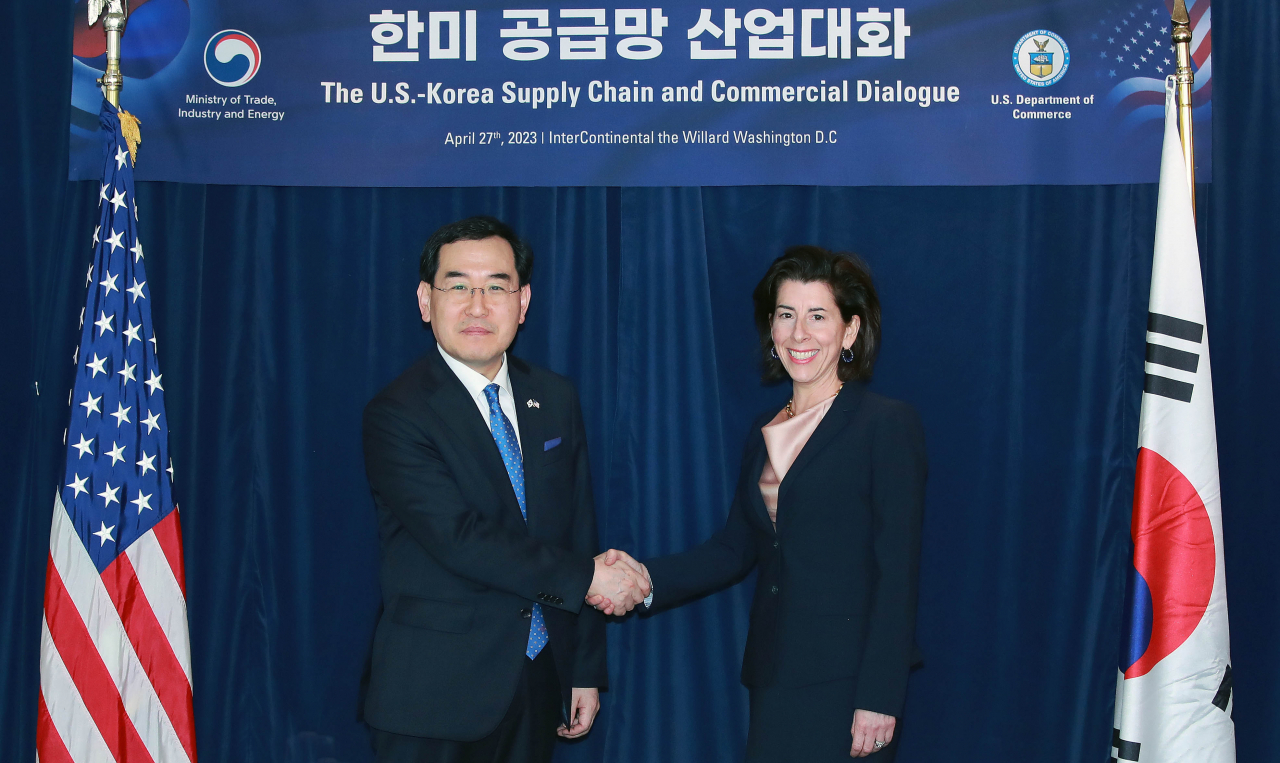 |
South Korean Industry Minister Lee Chang-yang (left) and US Secretary of Commerce Gina Raimondo shake hands during the first Supply Chain and Commercial Dialogue in Washington on Thursday. (Ministry of Trade, Industry and Energy) |
South Korean Industry Minister Lee Chang-yang and US Secretary of Commerce Gina Raimondo agreed to minimize uncertainties and business burdens chipmakers face over the US’ semiconductor subsidy program, Seoul’s Industry Ministry said Friday.
The two sides held their first Supply Chain and Commercial Dialogue, or SCCD, in Washington on Thursday and released a joint declaration statement, vowing to work closely together to minimize the impacts of the US’ CHIPS Act and Inflation Reduction Act, the ministry said. The meeting took place on the sidelines of South Korean President Yoon Suk Yeol's state visit to the US.
In their talks, Lee told Raimondo how the requirements of the US chip subsidy program create uncertainties for Korean chipmakers by demanding “excessive” corporate information from recipients and requiring them to share excess profit with the US government.
Lee also pointed out that the guardrail provision of the CHIPS Act limiting the beneficiaries from expanding chip production in China is causing business burdens, and requested the US Department of Commerce to help resolve the uncertainties, according to the ministry.
Washington announced the US CHIPS and Science Act aimed at boosting the country's semiconductor industry by offering ample subsidies to global chipmakers to build chip manufacturing facilities on its soil.
Samsung Electronics, the world's No. 1 memory chipmaker, is building a chip manufacturing plant in Taylor, Texas and has reportedly applied for the chip subsidy.
SK hynix also plans to build an advanced chip packaging plant in the US and is currently looking for a site to break ground.
"The participants will continue discussions on the requirements and opportunities of the CHIPS Act and Korean incentives for interested private sector entities to minimize uncertainties of corporate investments and business burdens," the two sides said in the joint declaration.
"The participants jointly share the desire to create favorable conditions for investment from Korean and US firms in both the Korean and US semiconductor ecosystems."
Under the agreement, the two sides vowed to closely cooperate on advanced semiconductors to implement necessary measures that protect national security while minimizing disruptions to global semiconductor supply chains, maintaining viability of semiconductor industries, and encouraging technological advancement.
Lee also requested the US government to take measures, addressing Korean companies' concerns over the one-year exemption of export controls they received to bring in chip equipment needed to produce chips in China. The waiver will expire in October.
The two countries will also establish a forum within the SCCD to bring both public and private research institutions of both countries to explore collaboration opportunities, the joint declaration said. The fields for potential collaboration include leading-edge and next-generation semiconductors, advanced packaging and advanced materials and parts.
The deal also included cooperation for supporting the growth of the robotics and additive manufacturing industries.







